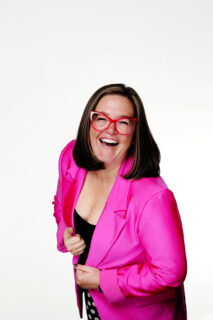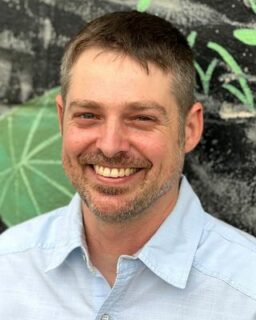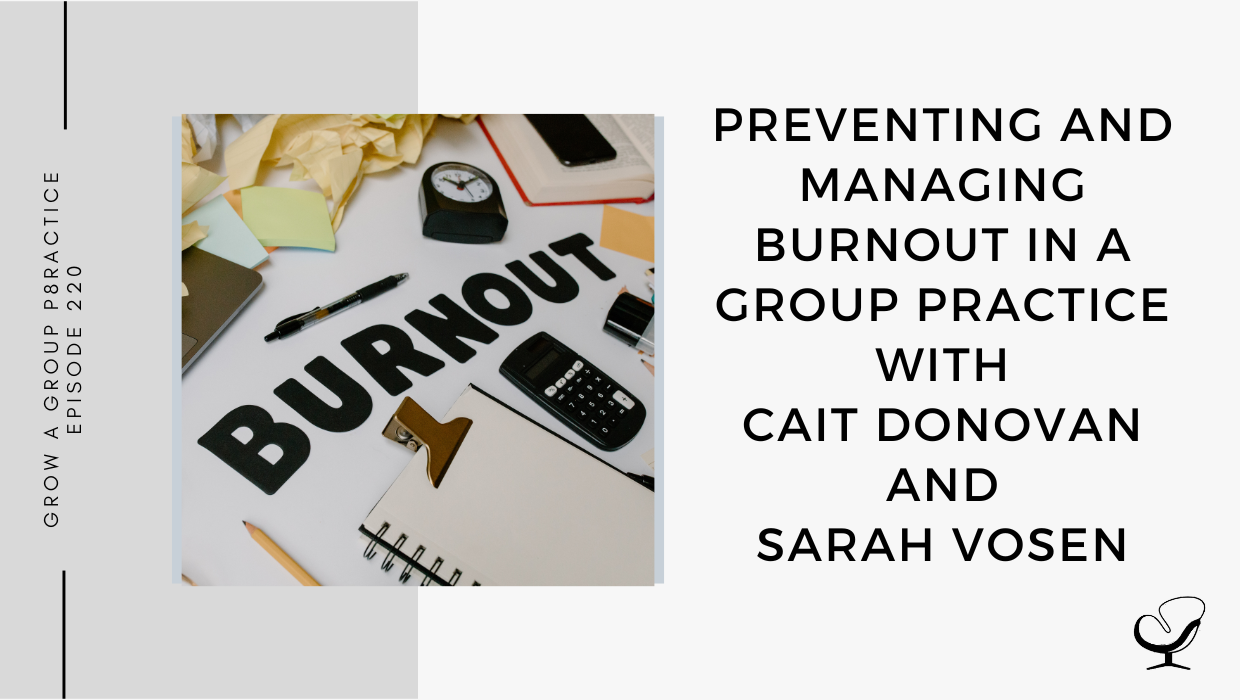Podcast (group): Play in new window | Download | Embed
As the CEO and practice owner, do you have help? Why is having help paramount to the sustainable success of your business? How can you notice burnout in your staff and help them to snuff it out quicker?
In this podcast episode, Andrew Burdette speaks about preventing and managing burnout in a group practice with Cait Donovan and Sarah Vosen.
Podcast Sponsor: Therapy Notes

As a therapist, I can tell you from experience that having the right EHR is an absolute lifeline. I recommend using TherapyNotes. They make billing, scheduling, notetaking, telehealth, and E-prescribing incredibly easy. Best of all, they offer live telephone support that’s available 7 days a week.
You don’t have to take my word for it – Do your own research and see for yourself – TherapyNotes is the #1 highest-rated EHR system available today, with 4.9 out of 5 stars on Trustpilot.com and on Google.
All you have to do is click the link below, or type promo code JOE on their website www.therapynotes.com, and receive a special 2-month trial, absolutely free.
If you’re coming from another EHR, TherapyNotes will import your demographic data quickly and easily at no cost, so you can get started right away.
Trust me, don’t waste any more of your time, and try TherapyNotes.
Meet Sarah Vosen

Sarah is a licensed acupuncturist & herbal medicine practitioner. Since 2022, guided by her experiential wisdom, she has been coaching people through Burnout Recovery at Fried. The Burnout Podcast, and running the group recovery programs.
Sarah loves to help people get out of pain & burnout, manage their stress, regulate their emotions, improve their mood, sleep, energy & digestion, and connect to their innate wisdom. As a highly sensitive person who has learned how to turn this neurodivergence into a blessing from what felt like a curse, she is delighted to help other sensitive souls learn to navigate the world feeling empowered, rather than overwhelmed by it.
Visit Fried. The Burnout Podcast and connect on Instagram and LinkedIn.
Meet Cait Donovan

Cait Donovan is an International Keynote Speaker, VP of the NYC Chapter of the National Speakers Association, host of “Fried – The Burnout Podcast,” author, and an acupuncturist with a master’s degree in Chinese medicine. Her creative burnout recovery solutions have been featured on podcasts and online magazines such as “Forbes”, “NPR,” and “The New York Post” and in companies such as The New York Public Library and PepsiCo.
Visit Cait’s website and listen to her podcast. Connect on Facebook, Instagram, and LinkedIn.
FREEBIE: Resentment Journal Cheat Sheet
In This Podcast
-
Defining and noticing burnout
-
Touching base with fellow clinicians and staff
-
Can burnout actually be prevented?
-
Ask for help!
Defining and noticing burnout
[According to the WHO], burnout is an occupational hazard that has three components; physical and emotional exhaustion, the second is cynicism and depersonalization, and the third is a feeling of a lack of productivity, or lack of impact/ meaning. (Cait Donovan)
Burnout is not in the DSM because you cannot necessarily diagnose it, but it is an occupational hazard. If it had to be diagnosed, a therapist could put it down as an adjustment disorder with external stressors – with it being client-dependent, of course.
Helpers, healers, and mental health practitioners often tend to over-give and can run a higher risk of burnout if they do not make a concerted effort to also take care of and consider themselves.
When you want to save others and save the world but you don’t have realistic expectations for yourself or for what’s possible, especially if you’re one person or a small group of people, that is a huge burnout risk factor. (Sarah Vosen)
Small things you can look for to notice burnout include:
- Personality changes from more positive or neutral to cynicism
- A sense of helplessness or despair
- Carelessness and disinterest in old passions or approaches that were once important
Touching base with fellow clinicians and staff
Within the mental health setting, Cait recommends starting the conversation gently but also frankly.
Bring up in an intentional and private conversation what you have noticed about them, in terms of changes, and explain that it makes you concerned for them, and whether there could be adjustments made at work to support them.
There’s a line between it just being stress or just being burnout, and that line is really clear; the line is, ‘either you can recover, or you cannot’ … With burnout, you can sleep for a week and still feel exactly the same. If you’re just stressed … You can have a long weekend … You come back, ready to go. (Cait Donovan)
If you suspect that someone on your staff is suffering from burnout, have a frank, open, and compassionate discussion with them. See if work could be adjusted around that time, and recommend that they take their PTO.
Can burnout actually be prevented?
Cait and Sarah have talked about it at length, with one another and fellow clinicians and researchers, and their answer is no.
Their answer is no because there are states of mind and body like perfectionism and co-dependency that become so familiar to a person, that they contain potentially maladaptive coping mechanisms, leading to burnout.
Once the burnout signs are there, it’s probably already present beneath the surface.
I wish it were different, but for each of us and so many people that we’ve talked to over the years, people don’t stop doing what they’re doing unless there’s a really really good reason that slaps them across the face, probably more than once. (Sarah Vosen)
Ask for help!
However, one of the best ways to curb burnout is to extend and lean on your network. Delegate tasks, ask for help, and find someone to work with. Usually, something that you are struggling with someone else can do easily, and vice versa.
Try this task: make a list of everything that you like doing, and everything you do not like doing. What do you have to do as the CEO? And the rest, what of the things that you don’t like doing can you hire out or delegate out?
Not all of your employees, especially if they are other therapists, are going to work the same way as you … So having a set standard operating procedure for the group as a whole is important, but leaving enough space for people to be authentic is a completely different part of the business that absolutely needs space and needs trust. (Cait Donovan)
As Cait mentions here, having a systems framework in your practice is necessary, but it is so helpful, powerful, and freeing to allow your clinicians and staff to bring in their own structure and approach to doing the work.
In this mediation, both you and your staff member need to trust one another.
Additionally, as the leader of the practice, you are highly encouraged to have a coach, leader, or mentor yourself.
The most important thing you need to understand is that your health and wellness, your mental state, emotional state, your clarity, and your alignment are paramount to the success of your business. So, make sure that you have people supporting you maintaining those things. (Cait Donovan)
Books mentioned in this episode:
Cait Donovan – The Bouncebackability Factor: End Burnout, Gain Resilience, and Change the World
Anne Helen Petersen – Can’t Even: How Millennials Became the Burnout Generation
Useful links mentioned in this episode:
- Visit Cait’s website and listen to her podcast. Connect on Facebook, Instagram, and LinkedIn.
- Visit Fried. The Burnout Podcast and connect on Instagram and LinkedIn.
- Trust me, don’t waste any more of your time, and try TherapyNotes.
Check out these additional resources:
- Preparing for and Navigating the court systems with Jill Williams | GP 219
- Practice of the Practice Network
- Group Practice Launch
- Group Practice Boss: www.practiceofthepractice.com/grouppracticeboss $149 a month
- PoP Group Practice Owners Facebook Group
- Free resources to help you start, grow, and scale
- Work with us
- Practice of the Practice Network
Meet Andrew Burdette

Andrew founded Mindful Counseling PLLC in Asheville, NC shortly after completing his graduate program in clinical mental health counseling. At the start of the pandemic, he pivoted to an online solo practice, and in 2022, began to grow a group practice. He most enjoys helping clients and colleagues identify what ignites their passions and assisting them in creating a life rooted in authenticity. Andrew approaches his business development with alignment in mind and enjoys the integration process connecting the many puzzle pieces and systems required to run a successful practice.
Visit Andrew’s website and Apply to work with him.
Email him at [email protected]

